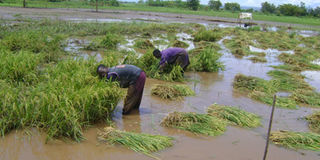Optimism reigns for rice farmers

Rice farmers at Rae in Nyakach district harvest paddy. Photo/FILE
If the number of financiers is anything to go by, then rice farming in Kisumu County could be on the rebound after years of steady slump.
Uncertainty may still reign over markets, but across the irrigation schemes in the county, the feeling among farmers and the National Irrigation Board is rather optimistic.
The Food and Agriculture Organisation (FAO) advanced a loan to the farmers in 2008 to kick-start Ahero and West Kano schemes, which were then experiencing difficulties and giving low returns.
The money that was recovered from the loan went to establishing a revolving fund. Though management challenges forced FAO to cancel a Sh24 million grant last year, new financiers have come on board.
They included the government through the Economic Stimulus Package, in which the farmers got Sh196 million last year. There is also the Agricultural Finance Corporation, and some banks.
Senior Schemes Manager for National Irrigation Board (NIB) West Kenya Schemes Laban Kiplagat says the arrival of the new financiers is a bonus as farmers prepare to start growing crops twice a year.
“We have got other financiers, such as the Agricultural Finance Corporation and some banks, which occasionally top up farmers’ financial needs. And now that we are going into second crop, farmers need to have a stronger financial base,” said Mr Kiplagat.
Mr Kiplagat oversees NIB’s activities in Ahero and West Kano irrigation schemes. He also supports out-grower areas in South West Kano.
“There is positive synergy between local MPs, the farmers and NIB to make irrigation agriculture affordable, rewarding and sustainable.
“We hope that devolution will make us competitive and enable rice production within the county to be the major income earner...” he added.
Ahero irrigation scheme measures 2,168 acres. West Kano scheme occupies 2,220 acres, while South West Kano covers 3,400 acres, but has only 2,000 acres under rice.
“NIB’s role is mainly to provide irrigation water within the schemes and to carry out major operation and maintenance of the irrigation structures. There is an undertaking with the farmers that they do minor operation and maintenance, as well as produce the crop,” he said.
While farmers have been toiling tirelessly to improve their income, the rising cost of oil and electricity poses the biggest challenge.
In these schemes, Ahero gets its water by pumping from River Nyando, which is expensive as oil and electricity prices are consistently on the upward trend.
Meanwhile, West Kano farmers have to pay for the cost of pumping water into and out of their farms from Lake Victoria.
Only farmers in South West Kano get water through gravity from River Nyando, which is cheap. The board has designed a gravity extraction plan for the other two schemes, but funds to implement it have yet to be secured from the government.
As the country moves into the devolved system, many in the area wish the plan could be put into practice to cut production costs and make them competitive.
Yields currently range from 10-25 bags of 90kg each for aromatic, and 15-30 bags for non-aromatic rice per acre. This is still low, although it is better than in the farms outside the NIB administration, quips Mr Kiplagat.
Agriculture expert, George Arombe, says the optimum output for rice in the region should be in the tune of 30-40 bags an acre under proper management.
To improve the farmers’ income, there is also a plan to have them to have biannual planting seasons, said Mr Kiplagat.
“Until now, the farmers have been growing a single crop a year, which denies them income. Plans are now underway to improve the farmers’ income through crop intensification and diversification,” the schemes’ boss said.
Under diversification, the main crop will still be rice, but there will be alternative horticultural crops or maize in between.
“There have been talks with Kenya Seed Company for farmers to produce seed maize. Our role will remain to provide water for irrigation,” he said.
NIB is in talks with the Cotton Development Authority (Coda) to have farmers grow the crop as an alternative.
Mr Kiplagat also said there were plans to expand horticulture in collaboration with the ministry of agriculture, Lake Basin Development Authority (LBDA) and NIB.
LBDA is planning to put up a cold storage for horticulture.



